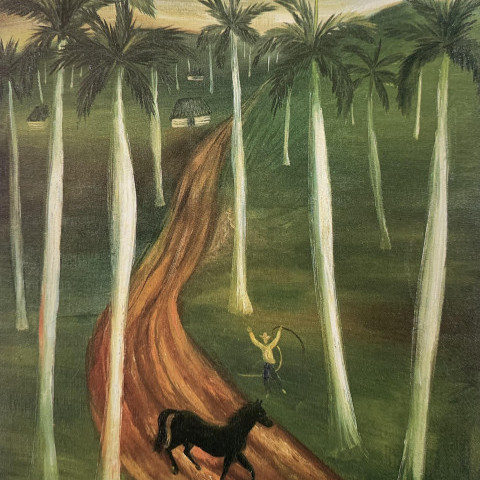A modernist figurative Latin-American painter and magazine illustrator, whose clients included House & Garden, Interiors and Norte, Mario Carreño was born in Havana but lived for extended periods of time in New York City and finally in Chile. He studied art in his native country at San Alejandro Academy; in Madrid, Spain beginning 1931 at the San Fernando School. There he met Pablo Neruda and his circle of intellectual friends including Federico Lorca and Rafael Alberti. To earn a living, he worked as a graphic designer, but those were tough times because of the impending Spanish Civil War. In 1935, he went to Mexico, where he worked with what he described as the "great muralists" including Diego Rivera, David Siqueiros and José Orozco. Influenced by these strong nationalists, he began injecting his own Latin American heritage into his artwork.
Two years later, he was in Paris, staying until 1939, and there attended the Academie Julian and organized his first exhibit. During that time, he began to gain attention as a painter, and he felt heady with the association with avant-garde artists. And then in the 1940s to get away from the dangers of World War II, he moved to New York City where he lived for the next decade and began the abstract painting style that became his signature work.
He returned several times to his homeland during that period, working as a teacher, but in 1957, he became especially enchanted with Chile, where he had been invited by his friend, Pablo Neruda, to get away from the Cuban Revolution.
Of Chile he said "he was always in awe of Chile, of its climate, its beaches, its seashells, especially the polimitas. For me Chile was a sort of paradise, in contrast to the overly fast paced reality of New York. I realized that it offered a different kind of life, more attuned to the rhythm of human beings, and that's what impelled me most strongly to stay." (La espera)
Living the remainder of his life in Chile, he acquired a distinguished reputation for his contributions to the country's culture. He founded the Universidad Catolica´s School of Arts, became a teacher in several study centers, and did public artwork such as the murals at the San Ignacio School, the Casiño of Viña del Mar, and Rancagua´s Hospital del Trabajador (1983).
He did landscape paintings including volcanoes and mountains, and did a series of female figures facing the sea, which were inspired by figureheads that Neruda kept in his coastal home.
In 1962, Carreño briefly visited Paris, and became very worried about the threat of atomic war. He expressed his traumatic feelings in a series, The Petrified World, which became his protest against human suffering and the horrors of warfare. He has also done paintings reflecting his love of Cuba, but has not returned to that country since 1957.
Mario Carreño died on December 20, 1999 in Santiago, Chile.
Collections representing his work include the Museum of Modern Art in New York, Musée de Paume in Paris, San Francisco Museum of Art, the National Museum of Havana, Caracas Bellas Artes Museum, France´s Musée d'Art Moderne of Ceret, Argentina´s Museo de La Plata, Washington´s Latin American Museum of Modern Art and Miami´s Metropolitan Museum.
Source: askart.com

